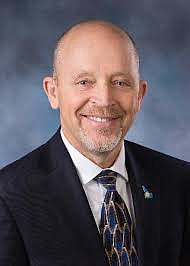'A revolutionary session'
The Idaho Legislature has taxes, health districts and Gov. Brad Little's executive powers on its agenda when the it convenes Jan. 11.
Sen. Steve Vick, R-Dalton Gardens, has begun working on legislation that would modify the abilities of regional health districts.
"Right now, the district votes to approve something and it effectively becomes law," Vick said. "My proposal is not a complete draft, but it would require one more step, a final step, where the county commissioners approve health district recommendations."
Vick and Ron Mendive, R-Coeur d'Alene, both said the topic of health districts would be notable this year.
"I'm concerned with the unelected bureaucrats making decisions that affect everyone's lives," Mendive said. "We need to get some transparency with the health districts, change the way they operate and limit their power."
An anticipated battle of the 2021 session is whether to remove some of the executive powers Little has implemented during COVID-19. At the beginning of the emergency response, lawmakers found that they were outdated, Sen. Mary Souza, R-Coeur d'Alene, said.
"They were written in the 1960s, so it will take the House and Senate working together to get those updated," she said. "We want to make them clear for what kind of emergency, like a physical attack or a natural disaster, different things come into play, and we need to know what the rules are."
Other discussion points to be expected are the management of federal grant funding, length of the state of emergency orders and lawmakers' power to return to session without governor permission.
"The governor has the ability to make all the decisions about the COVID state of emergency without any input from the House of Representatives and the Senate. We were not elected to sit idly by," Rep. Tony Wisniewski, R-Post Falls, said. "One of the primary issues we will be working on is returning the proper authority to the Legislature and making us independent."
COVID-19-related issues will be an overarching theme, Vick expects, as at least half his email is connected to the problem. There will be legislation restricting the governor's authority, he said. Maybe not specific abilities, but their duration.
"The time frames he can operate in without legislative approval, how much is spent when it comes to large grants of money, making the Legislature more involved instead of the governor's advisory council making all the decisions," Vick said. "Those will be a big discussion from day one until the very end."
Changes to some of these abilities would require a constitutional amendment, Mendive said, to allow legislators to call themselves back into session. Therefore, if the legislation passes through the statehouse, voters would determine its approval.
Taxes — everyone's favorite conversation — will also be the talk of the statehouse this year, according to Rep. Jim Addis, R-Coeur d'Alene. He co-chaired an interim property tax and revenue expenditure committee following the 2020 session's failure to resolve the state's long-term issue.
Addis will sponsor a uniformity and transparency bill that will report online the revenues and expenditures of all taxing authorities statewide.
"Local property taxes pay for a lot of local spending," Addis said. "It is a budget-driven system, so if we can make every taxing district's chart of accounts available, we can compare. I think it is going to revolutionize how we access local spending."
He believes that by having the transparency, entities would reduce budgets or at least slow the growth. All authorities — counties, cities, highway districts, schools — would be available through the state controller's website.
"I think this is going to be quite a revolutionary session, as opposed to evolutionary," Addis said. "There are a lot of great Idaho ideas on great subjects, and I think the Legislature is going to be very focused on getting a lot done."
Other initiatives in which the lawmakers expressed interest:
Sen. Steve Vick: Using Idaho's $530 million surpluses to eliminate the state's 6% sales tax on groceries, maintenance to the transportation system, the issue of water storage in southern and eastern Idaho and shared stewardship with federal and state entities over some of Idaho's national forest land in the Panhandle to preserve forest health.
Rep. Jim Addis: Revision of Idaho's sales tax code and Idaho's response to Oregon's Gross Receipts Tax that affects all commerce that has commercial activity in the state of Oregon even if the business is based in Idaho.
Rep. Tony Wisniewski: Resolving issues related to the limitation on in-person classes for students, reducing property taxes and the reconstructing of impact fees to aid new growth and transportation.
Sen. Mary Souza: Election integrity laws revolving around safety and security and a continuation of her financial literacy resolution that would extend financial education to high school and college students.
Rep. Ron Mendive: Legislation that would adopt the traditional education model to allow parents more choice in learning style, including an "education saving account" that would tie education funding to the student.
Rep. Doug Okuniewicz, R-Hayden: The freshman legislator said he intends to align with seasoned legislators to reduce property taxes, allow lawmakers to return to session without governor approval and focus on education reform, as well as gain support for a reentry center bill that would require the Idaho Department of Correction to apply for special use permits before constructing a facility.

